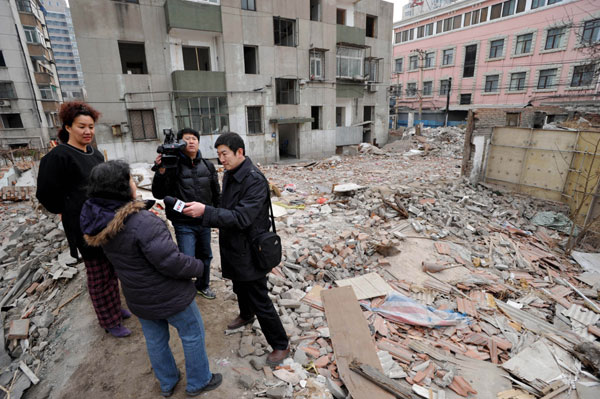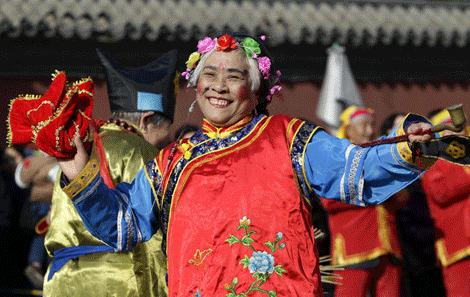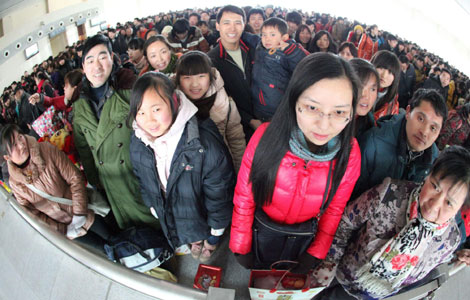Anger at demolition of renowned architects' home
Updated: 2012-01-30 08:02
By Cheng Yingqi (China Daily)
|
|||||||||
BEIJING - The latest demolition of a siheyuan, the traditional Chinese courtyard home, in the capital's Dongcheng district, has triggered a huge public outcry, as it once belonged to two architects famed for protecting the country's ancient buildings.
|
 |
|
Residents at the Beizongbu Hutong in Beijing's Dongcheng district on Saturday talk about the demolition of Liang Sicheng's former residence to a reporter with China Central Television. Li Wenming / for China Daily |
Between 1931 and 1937, Liang Sicheng (1901-72) and his wife Lin Huiyin (1904-55), both regarded as among the most distinguished modern Chinese architects, lived in the courtyard house located at 24 Beizongbu Hutong, Dongcheng district. It was here they finished their groundbreaking study on traditional Chinese architecture.
Liang and Lin probably never imagined that one day their home would meet the same fate as many other ancient buildings in the country had faced - being demolished to make way for real estate development.
Over the past decades, high-rising office buildings, apartment blocks, and sprawling shopping malls have mushroomed in the heart of Beijing, replacing the maze of siheyuans and hutongs - the narrow lanes that used to characterize the city.
In 2009, some parts of the courtyard were demolished to make way for a commercial development project, but the cultural authority stopped the demolition in response to public anger. Since then, the site has been designated as a cultural relic, though a low-level one, requiring approval from the cultural heritage authorities for any redevelopment.
However, what remained was "furtively torn down" during the recent Spring Festival.
"When I was at home on Thursday, I read a post on a heritage protection forum, which said Liang and Lin's former home had already been destroyed," said Zeng Yizhi, a cultural relics protection activist.
Zeng, who lives in Heilongjiang province, asked a friend in Beijing to visit the site to confirm the news.
"When I found the news was true, it broke my heart," Zeng said. "Liang and Lin made such a great contribution to the protection of Chinese ancient buildings; if their home can be torn down, then developers can do the same thing to hundreds other ancient houses in the country."
Zeng reported the situation to the Beijing municipal administration of cultural heritage and the Dongcheng district cultural heritage committee submitted a report to the municipal cultural heritage bureau on Saturday. In the report the committee quoted an unidentified developer saying that the demolition was "in preparation for maintaining the heritage site".
"The developer should have consolidated the ancient buildings instead of pulling them down." Zeng said. "According to the law, even if the courtyard was a dangerous building that needs repair, the project should have been carried out by a certificated construction company, which wasn't the case."
Media reports named the developer as Fuheng Realty, a subsidiary of China Resources.
The municipal government has said that Liang's residence will be rebuilt and that it has ordered the developer not to remove anything from the rubble.
"But if we replace every ancient building with a new replica, we will end up with a pile of meaningless fake antiques," Zeng said.
"Protected relics cannot be rebuilt once demolished, according to international cultural heritage protection principles," Chen Zhihua, professor with the School of Architecture at Tsinghua University, and a former student of Liang and Lin, told reporters.
"Building a replica only makes things worse. So I suggest that the government build a monument or a park on the original site in memory of Liang and Lin," Chen said.
As of 5 pm on Sunday, an online survey by the popular micro-blogging site Sina Weibo showed that 90 percent of the 8,360 participants said Liang's siheyuan should not be demolished because it is of great historical value.
An unidentified executive with China Resources' Beijing branch told Xinhua on Sunday that his company "could not agree" that the demolition was against related regulations.
Liang is considered "the father of modern Chinese architecture" for his pioneering role in advocating the preservation of the country's ancient architecture.
Liang was particularly known for his proposal with another architect Chen Zhanxiang to preserve the ancient city of Beijing and build a complete new city to the west of it after the Communist Party of China made Beijing the capital of the new republic.
But the country's leaders back then opted to build a political, economic, and cultural center within Beijing's historical core. Traffic jams, air pollution, and disappearing ancient architecture linked to poor urban planning in recent years have led more and more people to feel nostalgic for Liang's ill-fated plan.
Xinhua contributed to this story.
Related Stories
Famous traditional courtyard home bulldozed in Beijing 2012-01-29 08:52
Hot Topics
Kim Jong-il, Mengniu, train crash probe, Vaclav Havel, New Year, coast guard death, Internet security, Mekong River, Strait of Hormuz, economic work conference
Editor's Picks

|

|

|

|

|

|







